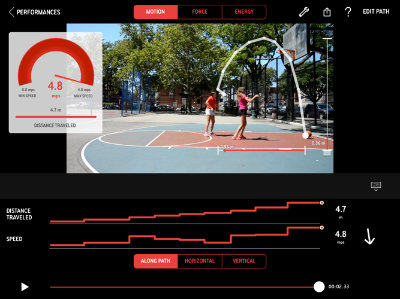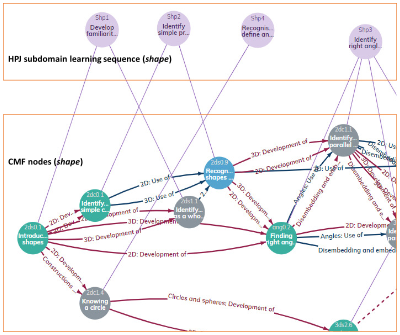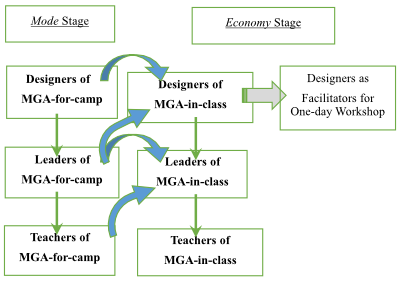Issue 13 – June 2021
Welcome to Educational Designer #14
The articles in this issue are each focussed on a design challenge. Harouna Ba and Dor Abrahamson discuss the designers’ dilemma of how much freedom to allow students to initiate and define their own tasks. They compare two movement-based STEM learning activities. Creating positive affect and agency were important for designers of both, whereas differing decisions on task-initiation reflected differing content goals and the expected contexts of the teaching and learning.
Martin Johnson, Rachael Horsman and Darren Macy outline the design process they used to create a framework of mathematics content which can be used by educators in emergency contexts where learners are forcibly displaced by conflict or disaster. Their major design challenge arose from the extended distance between the context of the development process and the unpredictable conditions in the enactment contexts.
Yu-Ping Chang, Fou-Lai Lin and Kai-Lin Yang are leaders of Taiwan’s Just Do Math project, which is a wide-reaching teacher professional development initiative built on a complex, multi-layered and multi-stage cascade model. They reflect on the design of professional development for the leaders who will help very large numbers of teachers embed the new principles into regular classrooms.
In commending these interesting papers to you, I wish to thank the editorial board and the anonymous reviewers for all of their work. In December, the editorial board was delighted when Daniel Pead, our Design Editor, received the first ISDDE Special Award to recognise “his role as Design Editor of Educational Designer - in the establishment of the journal and its design and publication since 2008, especially by enabling the publication of illustrative multimedia examples.” Greatly deserved, Daniel.
Kaye Stacey
15 May 2021
Taking Design to Task: A Dialogue on Task-Initiation in STEM Activities

Read article
Whereas movement-based STEM learning activities garner increasing interest among designers, researchers, and policy makers, much remains unknown regarding parameters of movement-based activity design affecting learning quality. One such parameter is task-initiation, namely the questions of who decides what should be accomplished with the resources—the designer or the student—and how movement-based STEM learning programs accommodate student choice during task-initiation. In this theoretical paper, we draw on an embodied design theoretical framework to lay out the issue of task-initiation by presenting and comparing two movement-based STEM programs. In both activities, students first perform a task and then model their performance as instantiating STEM concepts, but the programs differ with respect to task-initiation. In one program, the Mathematics Imagery Trainer for Proportion, students learn to perform pre-determined motor-control tasks by developing new perceptuomotor coordinations for enacting goal movements. In another program, Playground Physics, students use real playground equipment, such as a swing, and virtual playground play performances in the app to determine their own task, such as swinging as high as possible. As such, task-initiation design considerations are tightly related to designers’ overall rationales that, in turn, emanate from assumptions concerning, for example, the epistemic constitution of STEM content, the affective allure of STEM practice, manifestations of agency in STEM problem solving, and other contextual details, such as logistical, architectural, institutional, and curricular constraints governing student and teacher experience.
Ba, H., Abrahamson, D. (2021)
Taking Design to Task: A Dialogue on Task-Initiation in STEM Activities.
Educational Designer, 4(14).
Retrieved from:
http://educationaldesigner.org/ed/volume4/issue14/article54/
Design for Learning in Uncertain Contexts: Developing Maths Concept Sequences for Emergency Situations

Read article
In this paper we outline the design process that we used to create a framework of maths content for use in Education in Emergency (EiE) situations. EiE describes contexts where learners are forcibly displaced by civil conflict or environmental disaster. Although these situations require a fast response, they can last for a period of years, and often require the coordinated actions of various non-governmental and charity aid agencies. We describe the development of a series of maths concept sequences that would form the mathematics component of a larger curriculum framework (including literacy and science content). This framework of concepts would be used by educators in emerging EiE situations to help them to plan and organise their curriculum and to coordinate learning resources. Outlining our maths development project, we conceptualise the external and internal constraints that we navigated along the way.
Johnson, M., Horsman, R., Macey, D. (2021)
Design for Learning in Uncertain Contexts: Developing Maths Concept Sequences for Emergency Situations.
Educational Designer, 4(14).
Retrieved from:
http://educationaldesigner.org/ed/volume4/issue14/article55/
The Development of a Workshop for Cultivating Leaders of Mathematics-Grounding Activities in Class

Read article
Teacher professional development (TPD) is an important topic for school teaching and learning, but the challenging part is how to design quality and sustainable TPD that results in sound teachers’ learning. This research paper presents a cascade model of TPD used by the Just Do Math project and designed to nurture any number of teachers to teach mathematics in a more student-centered approach, rather than teaching mathematics in an inflexible way. The one-day workshop for cultivating leaders of mathematics-grounding activities in class (MGA-in-class), discussed in this article, is built on our previous TPD cascade model of scaling up the cultivation of designers, leaders, and teachers of mathematics-grounding activities for camps (MGA-for-camp). This paper focuses on presenting the process of developing and evaluating the one-day workshop for leaders of MGA-in-class. The development includes the processes of (1) how to transform activities designed for use in special camps to activities for use in regular classes, (2) how to cultivate the designers of MGA-in-class to be the facilitators in the one-day workshop for leaders of MGA-in-class, and (3) how to organize and evaluate the one-day workshop. Though the evidence shows that the one-day workshop has not recruited as many participants as previous TPD, the collected evidence provides useful information for future adjustment.
Chang, Y.-P., Lin, F.-L., Yang, K.-L. (2021)
The Development of a Workshop for Cultivating Leaders of Mathematics-Grounding Activities in Class.
Educational Designer, 4(14).
Retrieved from:
http://educationaldesigner.org/ed/volume4/issue14/article56/